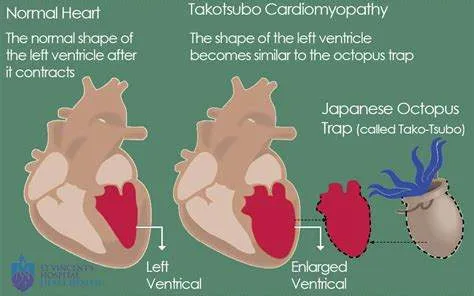
When stressed, a heart beats faster than normal that when left unrecognised and unchecked, the heart weakens in the long run. Remember Wycliffe in Wuthering Heights? He died of a broken heart there, or is this can just be an assumption? Has anyone heard of healthy but brokenhearted people not having any more WILL to live then passed away? Perhaps it's just coincidental?
Anyway, in acute medicine we call it a Broken Heart Syndrome. More often than not, it is a sudden occurence brought on by a severe stress where people have reported symptoms of chest pains, breathlessness or worst, a sudden collapse. Patients brought on to the hospital due to chest pains will have an electrocardiogram (ECG) that shows a result similar to a person having a heart attack. A diagnostic angiogram later will show normal results, and an echocardiogram to check how the heart is pumping will show severe Left ventricle (LV), the heart isn't contracting as it should. A cardiac blood biomarker called the troponin will also be elevated, and finally, the MRI will confirm the diagnosis.
Another term for it is Acute stress-induced Cardiomyopathy or takotsubo, this name originated in Japan where the shape of the heart's LV becames that of an octopus trap.

Patients' own stories of what brought on such symptoms were also confirmations by themselves.
Recalling a number of patients admitted as such, their histories have shown the same pattern. One has reported that the news of losing a family member brought on the symptoms, another got fired from her job, these among others shared the same sudden stress that occurred. An interesting story was a woman who had a flat tire in M11, a busy road in the outskirts of London.
For the management, betablockers are the standard medication and rest.
Medication-wise, Betablockers strengthen the heart muscles' contractility, slowing down the heart rate in the process, rest the heart and increase blood flow to energise the heart and the body.
As this is my entry to @naturalmedicine's Love Medicine February Challenge, i have no experience per se on what natural medicine or herbs to use in this situation, though what I've done was to find something similar to the action of betablockers.
The nearest thing that I can find are the foxgloves, the digitalis plant.
In traditional medicine, digitalis have an inotropic effect as it strengthens the contractility of the heart muscles. In the process, it controls the heart rate by slowing it down. One thing to consider though is that, this medication have a lot of side effects even with low doses where a high blood concentration causes toxicity, more so to the elderlies.
Naturally ingesting Foxgloves as a herbal choice is a different story, IT IS POISONOUS.
As with anything herbal, one great limitation is the right dosaging in its' application. Although, more often than not, regular intake of most herbs don't produce nasty symptoms or even if the intake is inadequate, FOXGLOVES in all it's parts is so poisonous that IT CAN STOP A HEART UPON INGESTION.
A William Withering upon witnessing a herbalist who was able to cure a patient with Chronic Heart Failure with a mix of herbs that included foxgloves found out that a small dose can actually slow down a heart rate and help muscle contractility. But how small is the quantity? On the same note, how can one quantify a correct tiny dose to be deemed safe if there are further trials on foxgloves?
Even though this is the case, it is very promising but with great limitation. As it is very powerful in its' action, where future trials will warrant correct dosaging. But will anyone be willing to partake in such trials? What's the tiniest dose that warrants it safe usage?
Time heals, Foxgloves do not.
For our syndrome, a repeat echocardiogram a few weeks later will confirm the LV's improvement and betablockers can be discontinued much later according to doctors' order of course. Just to mention here that a re-occurence can still happen in the future. Literature say that this have happened to males as well but most patients we have had were all females.
References:
Takotsubo cardiomyopathy
Foxglove extract-digoxin-helps the heart
Disclaimers : all images are sourced and linked appropriately.

